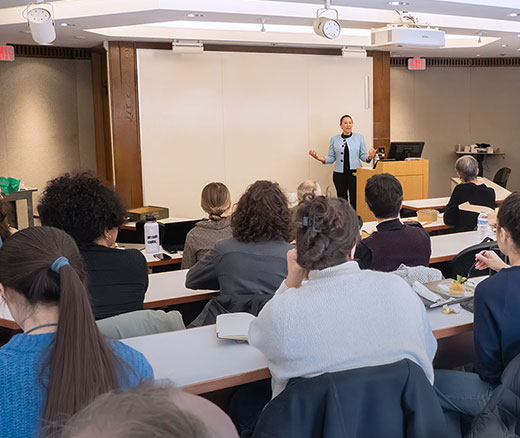
Virtual Nursing Gets Mixed Marks As Fix for Hospital Staffing Crisis
Remote Nurses Improved Quality Slightly but Can’t Replace Nurses at the Bedside, a New Study Finds
Substance Use Disorder
News
Even though U.S. overdose deaths have dropped sharply for two consecutive years, experts at a University of Pennsylvania virtual seminar argued the improvement may say less about successful policy than about shifting drug supply and a shrinking pipeline of new users — and that the nation is still misframing the crisis by treating opioid addiction as an individual ailment rather than a family-level social condition that ripples across generations.
In a Feb. 13 panel hosted by the Leonard Davis Institute of Health Economics (LDI), researchers in addiction medicine, policy, and behavioral science said the recent decline in fatalities likely reflects a combination of fentanyl market changes, expanded naloxone and treatment access, and fewer young people initiating opioid use after witnessing devastation among other household members. But the panelists warned that focusing on overdose death statistics alone masks broader persistent suffering, widening disparities, and severe morbidity from new street-drug adulterants such as xylazine and medetomidine among living users.

Moderated by LDI Senior Fellow Zachary Meisel, MD, MPH, director of Penn’s Center for Emergency Care Policy and Research, the panel participants were Jonathan Caulkins, PhD, professor of operations research and public policy at Carnegie Mellon University’s Heinz College; Yngvild Olsen, MD, MPH, national adviser to Manatt Health and former director of the Center for Substance Abuse Treatment at the Substance Abuse and Mental Health Services Administration (SAMHSA); and Rachel Winograd, PhD, Director of the Addiction Science Team at the University of Missouri, St. Louis.
Between 2024 and 2025, U.S. overdose deaths fell sharply — roughly a 25% to 27% decline from their peak — but the crisis remained severe, with about 72,000 to 76,000 deaths annually, or roughly 200 deaths per day.
The panelists agreed that lasting progress against the opioid epidemic will depend less on enforcement or short-term mortality metrics and more on reducing new addiction, integrating treatment into mainstream health care, protecting funding streams, and adopting policies that recognize addiction as a condition affecting entire families and communities, not isolated patients.
“It’s a very Western view of the world to think only the person with opioid use disorder is affected by OUD,” said Caulkins. “Most of the world thinks addiction is something that happens to families, and so I wish we could spend more time documenting the prevalence of people whose lives have been affected by the OUD of somebody else in their family, including people who have passed away. That is the way I think we should enrich or expand monitoring of the problem beyond the focus just on the deaths.”

Winograd emphasized that long-term epidemic control depends on preventing the number of individuals who begin using drugs — not merely preventing death among existing users. She said fewer young people appear to be engaging in opioid use after witnessing devastation among relatives. Historically, heroin initiation happened largely among troubled youth, but in the prescription opioid era initiation increasingly occurred among adults.
Olsen explained that “prevention in the context of opioid addiction is a broad concept encompassing primary, secondary, and tertiary approaches. This ‘big bucket’ includes efforts to prevent initial drug use, intervene early with at-risk individuals, and manage established addiction to prevent negative outcomes, with these strategies applying across a person’s entire lifespan.”
“As an addiction medicine specialist,” she continued, “I think about treatment of the parents as well as prevention for kids. If you get parents, grandparents, or caregivers who have substance use disorders into treatment, that is potentially going to have positive effects on their kids as they grow and develop.”

And as the demographics of opioid use shift, the street drug supply itself is changing just as dramatically, with synthetic fentanyl and veterinary sedatives such as xylazine and medetomidine increasingly mixed in as low-cost adulterants to stretch heroin and raise profits for drug traffickers. Each substance brings new dangers for users and challenges for clinical personnel who treat them.
A puzzle researchers have not cracked is why overdose deaths are declining and exactly what is driving that trend, particularly since national statistics mask uneven local realities. Arizona, Kansas, New Mexico, Hawaii, and North Dakota saw increases in overdose deaths during the same period they were declining elsewhere. Meanwhile, Black and American Indian populations continue to experience high or rising overdose death rates.
Another confounding factor is that the decline is occurring at about the same rate in the U.S. and Canada even though those countries have very different drug-deterrence policies. U.S. policy has historically emphasized criminal penalties and law enforcement campaigns against trafficking, while Canada has been more willing to experiment with harm reduction and supervised consumption sites.
Drawing on the recent article published in Science, Caulkins noted that, “the things done within each country may not be the drivers but rather, common external supply factors are important drivers of those big trends in deaths.”
Asking aloud what policymakers should do going forward, Caulkins noted the government can exert real control over treatment and prevention but has little reliable control over the illegal drug supply. He said policymakers should stop acting as if they can “shut off” the drug supply and instead invest heavily in what they can control, including:
• Expanding treatment programs such as methadone clinics
• Expanding school-based prevention
• Expanding outreach and harm-reduction programs
• Targeted policing of street dealers
“I don’t want to underappreciate how hard it is to logistically set up a treatment clinic or a surgery clinic or a family restaurant,” Caulkins said. “There are real challenges in getting anything like that done. But at the strategic national level, we can dial up more treatment. We could dial up more arrests of street dealers. We could dial up more school-based prevention. What you can’t just dial up are more supply disruptions.”
Winograd expressed frustration common to clinicians treating OUD patients.

“We interface with a lot of state government and researchers and have interactions with partners doing street outreach or trying to get people into treatment or running local recovery homes,” she said. “Deaths go down. We show our graphs and do our press interviews, but what we’re seeing on the streets is still so much suffering — young people using drugs, whole families using drugs together, and the houselessness problem. People can’t get connected to care, they don’t have transportation, and encampment sweeps destroy their possessions. At times it feels like we’re all talking past each other.”
“At the end of the day,” Winograd continued, “we have just a small handful of tools that save lives. That’s naloxone, buprenorphine, and methadone. But we still can’t get low-barrier access to these last two medications for opioid use disorder (MOUD) for addiction treatment without a bunch of requirements and low costs or no costs. And then there’s the stigma. There’s two kinds: conditioned stigma toward the people who use drugs and the intervention stigma toward the use of MOUD treatments. We are still not seeing the uptick in access to MOUD that you’d expect for something as effective as it is in reducing mortality by 50 to 80 percent.”
Olsen concurred. “As we’re talking about the challenges in the uptake of medications for OUD treatment, we have to keep in mind that the removal of the special X waiver in 2022 didn’t translate into significant uptake in prescriptions for buprenorphine,” she said. “For that reason, an important aspect of policy needs to be for health care systems and providers to fully embrace the screening and identifying of people with OUD and the use of evidence-based interventions to treat them. There needs to be real efforts to reduce barriers and engage and overcome the trust factor that is missing for a lot of people because of very bad experiences they previously had with in facilities that maintained very punitive kinds of frameworks and approaches to their treatment.”
Another major topic was opioid settlement funds. After thousands of lawsuits accusing drugmakers, distributors, pharmacies, and consultants of helping fuel the U.S. overdose epidemic through aggressive marketing and oversupply of prescription opioids, companies agreed beginning in 2021 to nationwide settlements totaling more than $50 billion, to be paid over roughly 10 to 18 years to states and local governments. The money — structured as public-health remediation rather than victim compensation — is intended to fund addiction treatment, overdose prevention, and recovery services.
But there is still concern that the money will be funneled off to other programs, particularly as the severe cuts made to Medicaid by the Trump Administration begin to bite down on state budgets. This, even though there were restrictions written into the settlement to avoid such diversions.
“The fact is that a lot of state agencies are in a really tough position as these Medicaid cuts come down,” said Winograd. “It seems likely that some of that needed money will come from the opioid settlements at the same time addiction-related services decrease because some states won’t be able to deliver them.”
As the session closed, moderator Meisel asked each panelist to name one action policymakers should focus on now:
• Caulkins: Reduce the inflow of new users to opioid use disorder.
• Winograd: Reform methadone policy to allow broader prescribing and pharmacy dispensing.
• Olsen: Health care systems must fully embrace screening, treatment, and evidence-based addiction care as core medical responsibilities.

Remote Nurses Improved Quality Slightly but Can’t Replace Nurses at the Bedside, a New Study Finds

Washington State’s First-in-the-Nation Insurance Plan Begins Payouts in Mid-2026, and Researchers Will Weigh its Effect on Care, Costs, and the Long-Term Care Markets

Without Pressure From Congress, NHANES — Which Helped Uncover High Levels of Childhood Lead, Nutritional Deficiencies, and Forever Chemicals — Will Cease to Exist

A Multi-State Study Finds That Parents Often Travel 60+ Miles—With Distance, Insurance, and Race Driving Gaps in Maternal Care

Former CMMI Leader Liz Fowler Cites Rigid Federal Scoring Rules and Bureaucratic Impatience for Pilot Failures

A Major European–U.S. Hospital Study Finds That Changing How Hospitals Are Organized Reduces Burnout and Turnover While Improving Care Quality